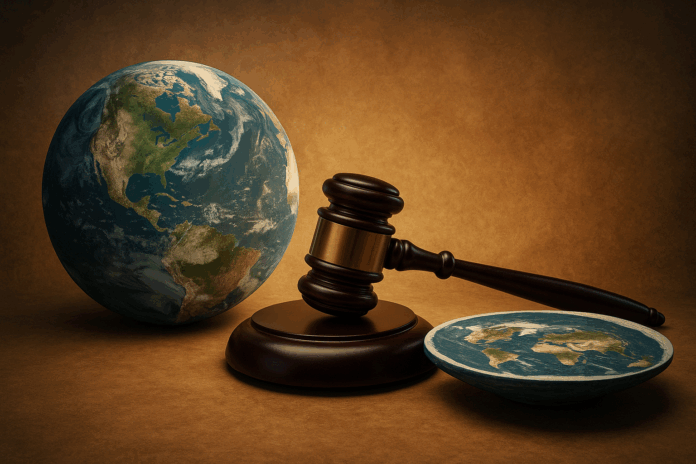
Reality Checkpoints
- No Judgment on Science: The judge refused to rule on whether Earth is flat or round—a deliberate legal sidestep that protected the court from wading into scientific waters.
- Contract Law, Not Cosmology: At the heart of the dispute was not Earth’s curvature but whether Thompson satisfied Garcia’s strict, arguably absurd contest terms.
By Samuel Lopez – USA Herald
GEORGIA – In 2019, a Georgia courtroom played host to one of the most bizarre contract disputes in recent legal memory. William Thompson, a curious skeptic and Earth science enthusiast, sued Zen Garcia, a self-proclaimed flat-earther, over an alleged failure to pay a promised $5,000 reward. The reward? It would go to anyone who could provide “real-world” proof that the Earth is a sphere.
Garcia’s offer, which gained traction in fringe circles and online forums, seemed to invite a takedown of pseudoscience. But as it turned out, the devil was in the details—and those details would ultimately sink Thompson’s case.
Zen Garcia, known in certain circles for his flat-earth podcasts and speculative theology, crafted his challenge with razor-thin criteria. To win the $5,000, participants had to produce “observable, unaided, real-world” evidence that proved Earth’s curvature. Scientific instruments were disallowed. Satellite imagery, math-based geodetic measurements, and traditional astronomical observations? Rejected.
William Thompson took the bait, submitting evidence he believed fulfilled the contest rules. But Garcia disagreed. When Garcia refused to pay, Thompson sued in Barrow County, Georgia. That’s where the courts took over—but not in the way either party expected.
The judge ruled against Thompson. The reason? He had failed to meet the specific, highly subjective requirements laid out in Garcia’s public challenge. While many observers were disappointed that the court didn’t use the case as an opportunity to rebuke pseudoscience, legal experts noted the wisdom in the judge’s restraint. This wasn’t a trial about truth. It was a test of contract.
This wasn’t the first time a flat-earth wager landed in court. In the 19th century, Alfred Russel Wallace, co-founder of evolutionary theory, faced a similar challenge from flat-earther John Hampden. Wallace won the wager but endured a legal and personal ordeal when Hampden refused to pay. Like Wallace, Thompson learned that engaging with fringe challenges is a gamble where the house—here, Garcia—holds the cards.
The Thompson v. Garcia ruling highlighted a key legal principle: courts don’t arbitrate scientific truth. They interpret contracts. Judge Weaver’s decision sidestepped the Earth’s shape, focusing instead on whether Thompson fulfilled Garcia’s terms. It was a procedural smackdown, not a scientific one, and it left flat-earth debates to rage on in online forums rather than courtrooms.
While the Thompson case may read like a legal oddity best filed under “weird news,” its contractual backbone has real-world consequences. It shows how:


